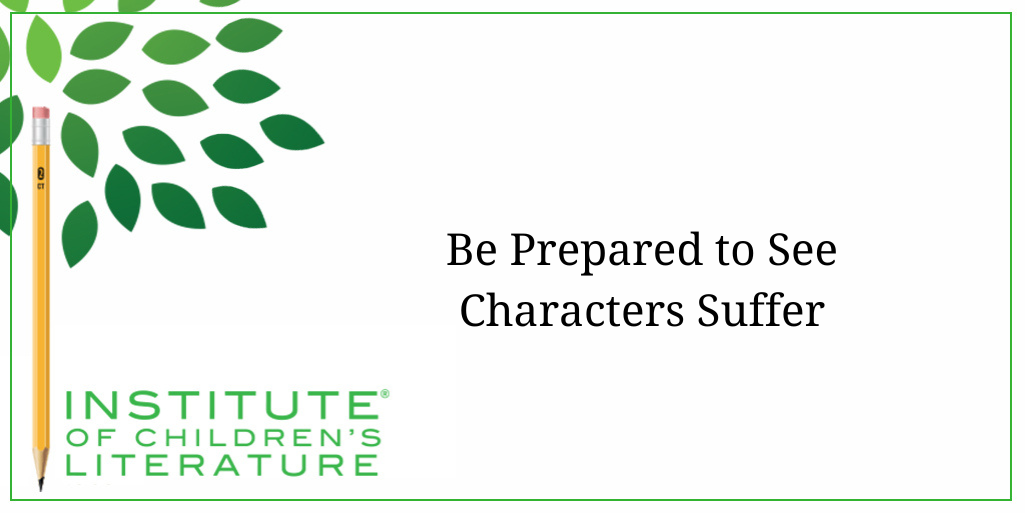
- Date: July 31, 2025
- Author: Jan Fields
- Category: Writing for Children Blog
- Tags: challenge, character, character creation
We teach our students how to write and get published!
View our Course Catalog >
Be Prepared to See Characters Suffer
Understanding and connecting with your characters is essential to making believable occupants for your stories. If you as author don't connect with them, readers are unlikely to do so. But there is a problem that comes with all that emotional connection. Connecting deeply with your characters means feeling pain for them when they hurt. And that can turn a writer into a rescuer. Nothing wrecks a story quicker than a writer who is trying to shield the characters from suffering. Story is about challenge. And challenge is about pressure and discomfort. Without discomfort, characters won't act, and without action, a story has no energy or interest. As a result, writers need to be prepared to see characters suffer. 
This was a lesson I had to learn. I'm a natural-born rescuer. When I was a kid, I would grieve for roadkill and imagine how I would have prevented the animal's demise if I was a superhero. Learning the lessons of life, namely that overcoming challenge creates strength, was tough for me. And when I eventually became a mom, I had to constantly remind myself that not letting my daughter overcome challenge was doing her a disservice. It's a lesson I continue to learn, and it hasn't gotten much easier.
As a result of being a natural rescuer, letting my characters suffer has been tough. When my stories are really clicking, I care deeply about my characters. I'm their biggest cheerleader. And I must constantly watch for my natural urge to rig the game so that it becomes easier for my character to win. In a story, stakes rise, and the plot becomes more compelling when a character faces stiff odds. So that means I must work directly against my nature if I'm going to tell a good tale.
Dipping into Darkness
Good characters and good plots get their energy from emotion. Fear, sorrow, anger, frustration, all are powerful emotions that inject energy into the writing. They are also not comfortable things to feel. Yet, if you are to write them, you're going to need to feel them. It's a bit like acting. To create, the writer takes on all the roles in the story. To do it well, you need to be open to feeling what the characters feel, so you will be able to see what this character will do in this situation.
If you make character creation a completely intellectual exercise, your character is likely to act in ways that don't feel emotionally true. I'm often frustrated when watching a movie and see characters who are in serious and immediate peril but have time to take a break and have a chat about backstory. It doesn't ring true. If I'm hiding from killers in my house, I'm not having a chat with anyone. I'm being as quiet as I possibly can and hoping I don't die of a heart-attack in the middle of everything.
 In real life, we haven't experienced everything our characters have experienced. I've written characters who see ghosts in paintings and mirrors. I don't do that. I've written characters who are chased through the woods by cryptids. I have never had that experience. I've written characters who face extremely unlikely things that I will never experience. To write them well, I need to draw on an emotionally congruent experience so I can write the actions and thoughts true. For the tough moments in a story, this can be uncomfortable. Writers talk about writing from their own dark places. One writer I've met calls it “writing from your own cellar.” But basically, it means drawing from times you felt a similar emotion strongly so you can write the scene with memory links to the emotion.
In real life, we haven't experienced everything our characters have experienced. I've written characters who see ghosts in paintings and mirrors. I don't do that. I've written characters who are chased through the woods by cryptids. I have never had that experience. I've written characters who face extremely unlikely things that I will never experience. To write them well, I need to draw on an emotionally congruent experience so I can write the actions and thoughts true. For the tough moments in a story, this can be uncomfortable. Writers talk about writing from their own dark places. One writer I've met calls it “writing from your own cellar.” But basically, it means drawing from times you felt a similar emotion strongly so you can write the scene with memory links to the emotion.
When I wrote about a girl who sees creepy things in a haunted house, I drew from my own experiences as a child. I was extremely imaginative. And my parents believed our house as haunted. Therefore, I was predisposed to interpret odd phenomenon through a lens of being haunted. I remember a specific event that was quite prosaic at the time and would never make it into a book, but it was a moment where I couldn't explain what was happening logically. And the uncanny event raised the hair on the back of my neck. It sped up my heartbeat. It made me feel afraid. And I can go back to that moment in memory, and rekindle those feelings, and take them into the haunted house of my story. I can mix how I felt when this real-life thing happened and “what if” it into the events of the story, making them feel more real for me as I write, and thus letting me write them better. In this way, writing is often tapping into real life to create fictional life.
Why Your Children Aren't Good Book Characters
Though mining real life is valuable, it isn't without issues. For all the reasons we've discussed, the problem of overprotecting characters grows harder when trying to turn real-life family events into a children's story or children's book. And there are even more issues. First, once we start telling a story from our own family, it's tempting to romanticize it. We don't want to come off poorly in a story where we are an actual character. If you're the mother character in the story, it's tempting to clean up a little, and make yourself a more patient, less distracted, less weary, more heroic version of yourself. No one wants to write a story where they come across as a bad mother. So, putting yourself in the story is complicated by a desire to look good.
Putting your children in the story carries with it several more issues. First, few of us think deeply about our children as people when they are children. They are loved. They are also a considerable amount of work. And there is a current of responsibility that runs through every interaction. As a result, slipping into the child character so you can truly understand that person and write well for that person is hard. It sounds like it'll be easy when you first consider it, but it's hard. Anyone who has ever done it and done it well will tell you that it's hard. When you build a character from scratch, it feels much less invasive to dig deeply into motivations and thoughts. When you're trying to write a character that is strongly based on your child, it can be uncomfortable to make so many assumptions about the child's thoughts and feelings. And if you don't manage to inhabit the character, the story result is almost certain to be flat and difficult for readers to engage with.
Finally, the issue of putting your child character in danger is tough when it's your child the character is based upon. As challenging as real life can be, sometimes you have to crank it up even more when it's a story. You may have been a panicky mess when you lost your child in the clothing store at the mall, but to make it truly compelling as a story, you'll need to pile on more discomfort. You may need to create some situation where the problem must be resolved quickly, or the situation will become much more dire. You may need to put the child character or even the “you” character at real risk. Upping the stakes makes for a better story, but it also ups the discomfort in writing it.
You're also going to need to be careful about handing out blame. In real life, we spend a lot of time blaming people. In stories, a writer needs to do less of that and mostly must accept that each character is acting in a way that seems completely sensible and right to that character. The child character hiding in the clothes rack is simply trying to relieve the painful boredom of clothes shopping by turning it into an adventure. The child isn't being disobedient or thoughtless or trying to make the mom miserable. The moment isn't a failure of parenting. It's simply a child being a child.
Don't Fear the Feeling
Writers need to be brave. It seems an odd truth since writers spend so much of our time appearing to be completely safe, tapping along on our keyboards or scrawling in a notebook. But great writing requires a lot from the writer. We have to dig deep into ourselves to create truth on the page from the reality of our own existence. Then after connecting deeply to the story, we must be brave about facing the challenges in the writing, knowing they're going to be uncomfortable. We have to make decisions that go against our own emotional reactions by imperiling characters we love. And we have to do it alone for the most part. It's a scary journey and a tough one, but like every writer's story, it is a gift as well. We learn more about ourselves and our world as we create the world of our story and walk it boldly. So be brave and embrace the adventure. The results will be amazing.
Related Articles for Character Creation
With over 100 books in publication, Jan Fields writes both chapter books for children and mystery novels for adults. She’s also known for a variety of experiences teaching writing, from one session SCBWI events to lengthier Highlights Foundation workshops to these blog posts for the Institute of Children’s Literature. As a former ICL instructor, Jan enjoys equipping writers for success in whatever way she can.




